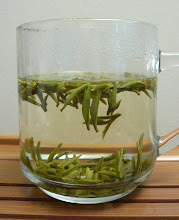The tea leaves are from ancient tree of Nan Mei village. I tried a Nan Mei village tea last year and liked it very much. While I was thinking of buying more, it was all bought up by somebody! What one fails to grab is always the best :-p From then on, I had the name of Nan Mei village in mind. Rumors are a lot of puerh products claimed to be Bing Dao tea are actually made with harvests from Nan Mei village. I have no way to find out how true it is. But Nan Mei village is indeed very close to Bing Dao, and therefore its taste is somewhat close to that of Bing Dao.
This tea is from a factory that was bought up by another company in 2007. Therefore, the trade mark as showed on the wrapper (the little hills) no longer exists. There have been more than a few tea factories in Lin Cang and their names are all something like Lin Cang Tea Factory. So the trade mark is important for recognizing products.
These products were made with leaves from old tree in Nan Mei village. It used to be common to use leaves from old trees to make puerh. Nowadays, not many factories make 100g tuo out of leaves of old tree. So these tuos mark the end of an era for this factory. Interestingly, a few people, including an award winning tea export, Yang Zhaofei, started a new company, Old Lin Cang, to continue the products and styles of their old factory. I think that's a neat idea and wish them good luck! One of the factory traditions that they have retained is using leaves from old tree only, for all their products.
I don't think I am very crazy about puerh. But I do love puerh from Lin Cang region very much. Sometimes, when I recommend Lin Cang tea to people, I would say, even I love it :-p Unlike a lot of teas from Meng Hai, many Lin Cang teas are very drinkable when young, with great mouth feel and floral aftertaste. I believe that's why Lin Cang was one of the most important tribute puerh regions, and Meng Hai was never one. One thing I am not sure yet about Lin Cang tea is, if it's so tasty when young, and if its strength is the aroma, will it age well? Taste is subjective to each individual. I already suspect that I would rather drink Bing Dao and Yi Wu before they get too old, but I shall wait to see more. I remember seeing a very positive review of a 1980s version of this tuo by a famous tuo collector. I still don't know if that means the taste absolutely improves after 20 years, but I guess at least the review indicates this tuo has pretty long shelf life.
There was something else that made me intuitively like Lao Lin Cang as a company. Shortly after I made my purchase of some tuos and cakes from them, they started a promotion with reduced prices. The price difference was not large before and after the promotion. But I got a few extras of these tuos from them, and these tuos are my recent favorite! Besides, there was a letter explaining the matter, hand-written with an ink pen, from the manager, who happens to be an outstanding calligrapher. The calligraphy on the letter is at artistic level. I don't think the manager hand-wrote this letter out of a spirit of perfect customer service. I guess he would just take any opportunity to use a pen and write something physically on a piece of paper, and typing was just not an option for him. These days I've almost entirely lost my capability of hand writing, and my ink pen has dried out for years. So I read this letter with a lot of admiration.
六堡茶道美学煮茶
3 years ago





































No comments:
Post a Comment